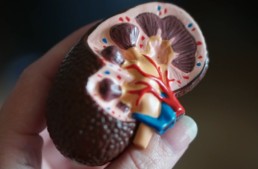
Modern western medicine doesn’t put particular emphasis on the kidneys. They are appreciated for their work in filtering waste and toxins from the blood, and any issues are addressed through medication.
In cases of advanced kidney disease, the work normally completed by kidneys is managed through dialysis until a kidney transplant is possible.
Traditional Chinese medicine takes an entirely different approach to kidney health. The kidneys are revered for the critical role they play in storing and managing a person’s qi – the basic life force energy that flows through the body.
According to this practice, kidneys house a special store of qi that is inherited from parents. When other organs are struggling, kidneys provide support by sending some of this prenatal qi to revive them.
The Yin & Yang Of Kidney Health
When they are healthy, the two kidneys offer a perfect balance of yin and yang, serving as the “congenital foundation” or source of life.
On the yin side, kidneys control the water element, ensuring that all tissues and organs are hydrated and nourished.
On the yang side, kidneys control the fire element, warming tissues and organs to ensure peak function.
When there is an imbalance or disruption to the yin and yang of the kidneys, qi is depleted. This has a ripple effect throughout the body, leading to a variety of health concerns.
What is Kidney Qi?
The qi stored in kidneys forms the foundation of major life activities. It supports growth and maturation of the mind, body, and spirit, and it controls the elements critical to reproduction.
In fact, many cases of infertility have been corrected when kidney qi has been restored in one or both parents.
Kidney qi increases naturally during infancy and childhood to ensure that there is ample energy to support the massive physical and emotional changes that occur in early years.
Kidney qi peaks during adolescence, once the primary job of bringing the body to maturity so that reproduction can occur is complete.
In healthy people, kidney qi stays high during early adulthood and middle age, before beginning its slow decline as the body transitions into old age.
When there is a significant imbalance in the kidneys or a substantial kidney qi deficiency from birth, growth and development may be impacted.
In later years, both men and women may experience infertility, and in some cases, symptoms of aging like deafness, baldness, and brittle bones will appear earlier than expected.
Practitioners of traditional Chinese medicine typically examine patients’ lifestyles, medical histories, and current symptoms before diagnosing and treating kidney qi deficiency to resolve these issues.
What is a Kidney Qi Deficiency?
Each organ has its own balance of yin and yang, but the kidneys are special. They hold the key to balance and life energy for the entire body. Kidney qi deficiency, or a deficit in the energy stored in the kidneys, may lead to widespread symptoms throughout the body.
Conversely, because the kidneys form a foundation for life’s most important activities, any deficit in critical areas can lead to low kidney qi. A lack of mental stimulation has been shown to disrupt kidney qi, as has the absence of love, family, and friendship.
When basic physical needs aren’t met, such as food, water, shelter, and clean air, kidney qi may suffer.
Chronic stress, on-going sadness or depression, or living in an unsafe environment for an extended period can also affect kidney qi.
The simple process of aging and all of the physical and emotional changes that come along with it can drain kidney qi, and serious medical conditions such as autoimmune diseases and cancers can deplete kidney qi rapidly.
What are the Symptoms of Low Kidney Qi?
When kidney qi is low, the entire body suffers, and a variety of symptoms may result.
Some people experience fatigue, shortness of breath, sudden, unexplained sweating, a weak pulse, and/or a swollen tongue, while others have a general sense of melancholy, a lack of interest in once-loved activities, and/or reduced participation in social interactions.
It is common to notice unusual and unexplained body aches and pains, as well as a loss of appetite, trouble sleeping, fever, and one or more digestive upsets like nausea, bloating, or diarrhea.
Of the sensory organs, ears have a special relationship with the kidneys, so low kidney qi can manifest as ear-related issues.
Examples include chronic ear infections, tinnitus, or deafness. Kidneys are also linked to the bones, so low kidney qi may be recognized through poor bone health.
Some of these conditions include tooth decay and osteoporosis. A combination of therapies and treatments may be needed to fully resolve kidney key deficiency.
What are the Best Foods to Increase Kidney Qi?
One of the basic tenets of traditional Chinese medicine is that the body will tell you what it needs if you pay close attention.
Often, a kidney qi deficiency shows as a strong craving for foods that support kidney function.
Beans and seafood top this list – particularly black beans and seaweed. The salt in seaweed and seafood is particularly helpful in supporting kidney balance.
Bone broth is a popular remedy for kidney dysfunction, as are walnuts, black sesame, blackberries, mushrooms, black tea, and water chestnuts.
As you choose foods that are especially effective in restoring and increasing kidney qi, it is also wise to decrease consumption of foods associated with depleting kidney qi. Some of the worst offenders include cheese, sugar, table salt, fried foods, and red meat.
How Do You Nourish Your Kidney Qi?
In addition to choosing kidney-strengthening foods, you may wish to consider other physical therapies to support kidney qi. There is a connection between the kidneys and the ears, so it is worthwhile to massage the ears for a few minutes each day.
You can massage the heels and soles of your feet as well, which are on the same meridian as the kidneys and bladder.
Pay careful attention to the yongquan pressure point, found right in the middle of the foot. This point has a direct connection to the kidneys.
Alternatively, some choose to stimulate the kidneys through the feet by stomping on the ground slowly and deliberately for about five minutes per day.
You can develop and nourish qi throughout your body with the practice of Tai Chi or Qigong, and if you are struggling with stubborn qi-related concerns, you may wish to consider acupuncture. This can clear blockages quickly and effectively in particularly difficult cases.
Your practitioner may also suggest a customized blend of Chinese herbs, and/or therapies specifically intended to manage emotions such as counseling.
What Emotions are Stored in the Kidney?
The kidneys have a substantial influence on mood, because they serve as home for a number of powerful emotions. The one with the greatest impact is fear, which can manifest as anxiety and panic attacks.
Often, people suffering through these conditions have an imbalance of yin and yang in the kidneys, or there is a kidney qi deficiency. As you are working to overcome anxiety, consider eliminating foods that disrupt kidney function, such as caffeine, cinnamon, alcohol, and stimulants.
It’s important to note that while poor kidney health can lead to excessive fear, the converse is also true. Excessive fear can lead to poor kidney health.
You can guard against the possibility of strong emotions affecting your organs by experiencing and working through each feeling as it comes up, rather than repressing, hiding, or ignoring them.
Some of the most effective ways to fully experience and manage emotions include meditation, journaling, and talk therapy.
When it comes to kidney qi, the most effective approach is a holistic one. Certainly, you can support kidney health through deliberate food choices and practices specifically intended to support kidney qi.
However, participation in activities that build qi, therapies that release built-up emotions, and lifestyle changes that reduce stress and build strong relationships are more likely to create lasting qi throughout the body.
What’s Next?
About the author

